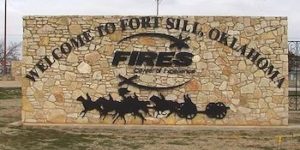
Fort Sill
*The site of Fort Sill was founded on this date in 1869.
Located in Lawton, Oklahoma, this was a strategic post-American Civil War location that leveraged the use of Black soldiers against Native Americans to expand the white government's land acquisition in the West. Maj founded Fort Still. Gen. Philip H. Sheridan led a white-American Campaign into Indian Territory to stop tribes from fighting against white border settlements in Texas and Kansas. Sheridan's massive winter campaign involved six cavalry regiments accompanied by frontier scouts such as "Buffalo Bill" Cody, "Wild Bill" Hickok, Ben Clark, and Jack Stilwell.
Troops camped at the location of the new fort included the 7th Cavalry, the 19th Kansas Volunteers, and the 10th Cavalry "buffalo soldiers," who constructed many of the stone buildings still surrounding the old post quadrangle. At first, the garrison was called "Camp Wichita" and referred to by Native Americans as "the Soldier House at Medicine Bluffs." Sheridan later named it in honor of his West Point classmate and friend, Brigadier General Joshua W. Sill, who was killed during the American Civil War. The first post commander was Brevet Maj. Gen. Benjamin Grierson, the first Native American agent, was Colonel Albert Gallatin Boone, the grandson of Daniel Boone.
Several months after the establishment of Fort Sill, President Ulysses S. Grant approved a peace policy placing responsibility for the Southwest tribes under Quaker Native American agents. Fort Sill soldiers were restricted from taking punitive action against the Native Americans, who interpreted this as a sign of weakness. They resumed raiding the Texas frontier and used Fort Sill as a sanctuary. In 1871, General of the Army William Tecumseh Sherman arrived at Fort Sill to find several Kiowa chiefs boasting about a wagon train massacre. When Sherman ordered their arrest during a meeting on Grierson's porch, two of the Native Americans attempted to kill him. The Commanding General's quarters were called Sherman House in memory of the event.